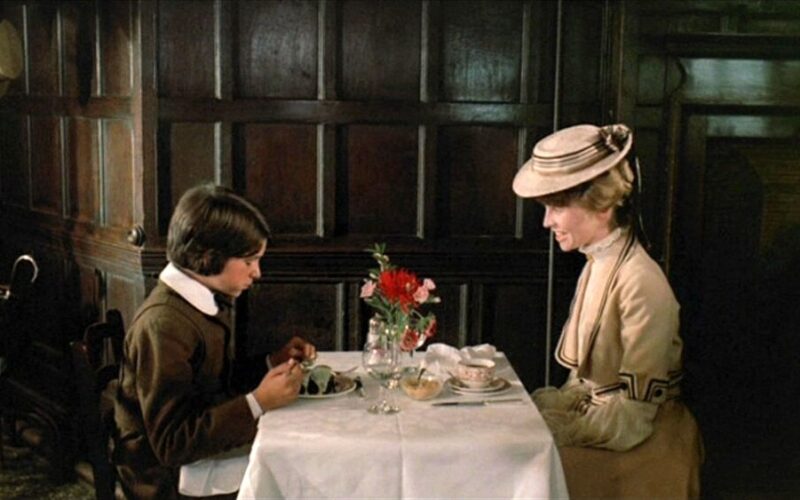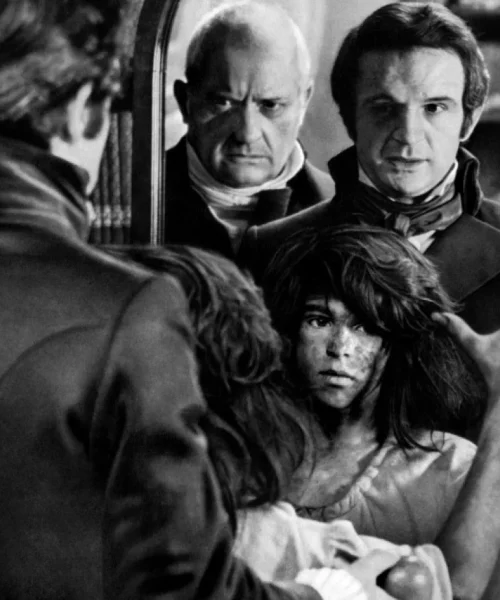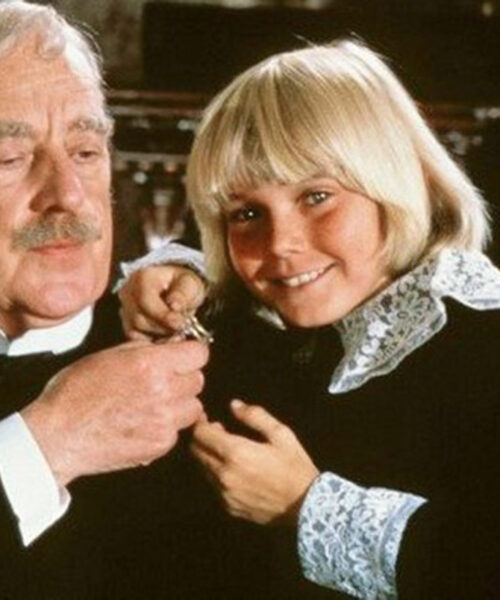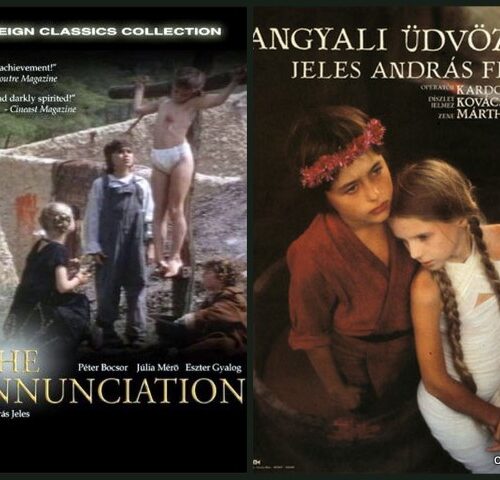“Messenger of Love (The Go-Between),” a 1971 film directed by Joseph Losey In the world of cinema, few films have managed to capture the complexity and vulnerability of lost innocence as skillfully as Joseph Losey’s “Messenger of Love” (The Go-Between). Thanks to a finely crafted script by Harold Pinter, the film becomes a whirlwind of nuances and allusions, an intricate web of clandestine passion and social discord set in the British countryside of the Edwardian era.
Joseph Losey demonstrates acute sensitivity in directing, particularly in how he handles the sensuality and erotic tension of the film. Here, the sexual charge is never crude or vulgar; rather, it’s a subtle thread that runs beneath the surface of the entire narrative, permeating every glance, touch, and word. Losey manages to elevate the theme to an almost mystical level, using the countryside as a character in its own right that symbolizes the unstoppable force of passion.
But it is perhaps Dominic Guard, in the role of Leo, who steals the show. Guard embodies innocence and vulnerability with a sensitivity that is at times disconcerting. His performance is a delicate balance between youthful curiosity and a growing awareness of the complexities of the adult world. His naivety serves as the perfect counterpoint to the burning intensity of Marian and Ted’s relationship, making his loss of innocence not just a personal rite of passage but a microcosm of the social and moral corruption that pervades the environment in which he lives.
The interaction between Losey’s direction and Pinter’s screenplay harmoniously blends with Guard’s performance, creating a cinematic synergy that elevates “Messenger of Love” well beyond the confines of the romantic drama genre. The film is a penetrating meditation on how innocence is sacrificed on the altar of social conventions and forbidden desires, a story as universal as it is intimately personal.
Ultimately, “Messenger of Love” is a masterpiece of visual and narrative storytelling, a film that challenges the viewer to confront the intricate facades of morality and desire, while casting an unparalleled spotlight on the devastating beauty of lost innocence.
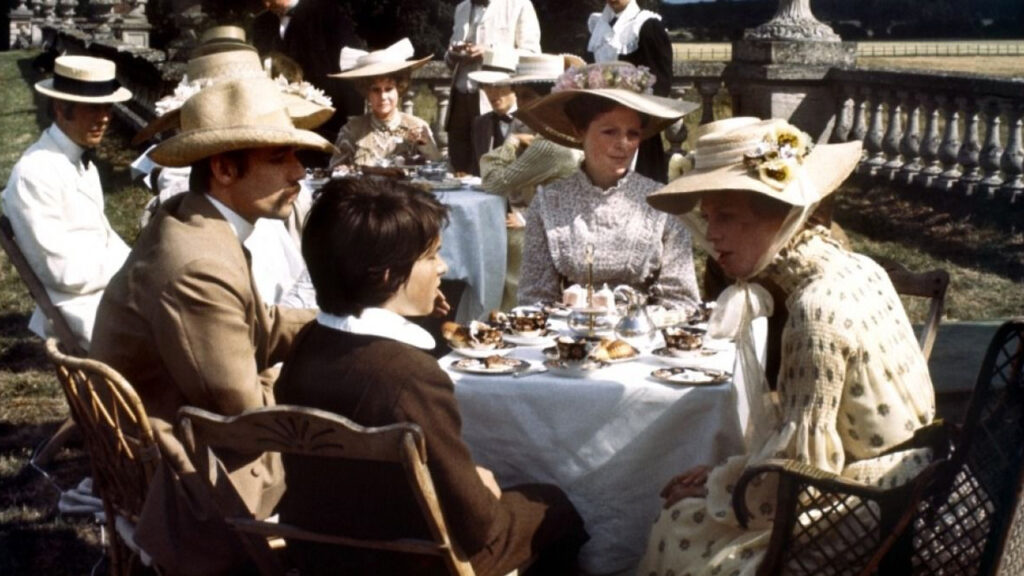
THE PLOT
The film “Messenger of Love” is set against the rural expanses of Edwardian England and centers around Leo, a preadolescent boy. He experiences an unforgettable summer in a lavish country villa, surrounded by the luxury and privileges of an aristocratic family. In this idyllic atmosphere, Leo unwittingly becomes entangled in a complicated clandestine love affair between Marian, the heir of the hosting family, and Ted, a man from the nearby fields. Without fully understanding the implications, Leo becomes the messenger between the two lovers, delivering secret letters and messages.
As the summer progresses, Leo begins to become aware of the sexual tension and emotional complexity surrounding him. He witnesses the deep class divisions that stratify the society of the time and starts to realize the moral responsibilities his role entails. Leo’s innocence is severely tested, especially when he discovers the truth about Marian’s imminent arranged marriage to another aristocrat, Hugh.
The relentless passage of time, symbolized by an impending solar eclipse, serves as a countdown to the inevitable catastrophe. In the end, the relationship between Marian and Ted is discovered, with devastating consequences for all involved. Leo, now deprived of his innocence, is forced to confront the harsh reality of the adult world, a universe where love, class, and naivety intertwine in a complex design of passions and prejudices.
The film concludes with an elderly Leo returning to the estate many years later, a visit that serves as a painful reminder of lost illusions and irreparable wounds inflicted by life. The past and present overlap in a bitter ending that leaves the viewer to reflect on the inevitable consequences of choices made and opportunities missed.
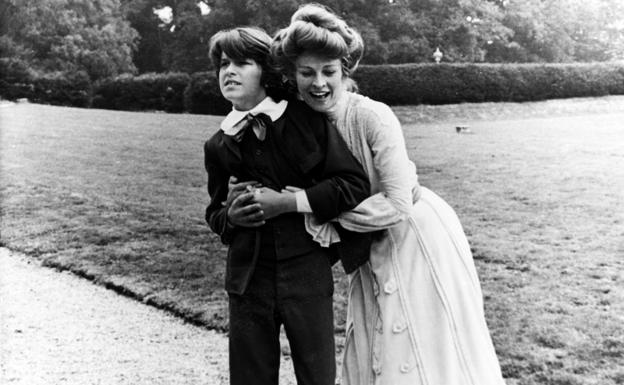
STRENGTHS
“Messenger of Love” boasts several strengths that contribute to its status as a classic of British cinema:
- Joseph Losey’s Direction: Losey’s sensitive and attentive direction immerses viewers in the setting and emotions of the characters.
- Harold Pinter’s Screenplay: Pinter’s script is dense with undertones and ambiguities, elegantly capturing the complexities of human relationships and social dynamics.
- Performances: Julie Christie and Alan Bates are magnetic in their roles, while Dominic Guard delivers a remarkable performance as Leo, the naive young messenger.
- Cinematography: The cinematography is spectacular, using the English countryside as an almost mystical backdrop that amplifies the love story and social tension.
- Universal Themes: The film addresses timeless themes such as innocence, social class, and the dynamics of desire in a way that continues to resonate with modern audiences.
- Narrative Structure: The skillful use of flashbacks and time jumps enriches the plot and adds a dimension of tragic inevitability to the story.
- Emotional Subtlety: The film manages to convey a range of emotions without ever becoming melodramatic, leaving much to the viewer’s interpretation. These are just a few of the many elements that make “Messenger of Love” a film worthy of attention and discussion.
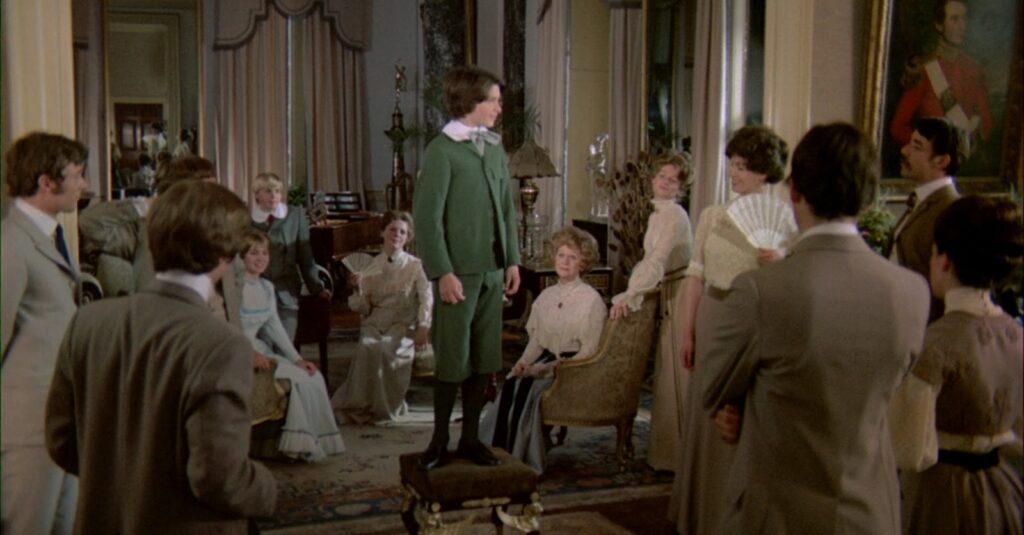
Who Should Watch It
“Messenger of Love” is a film that might particularly appeal to various audiences:
- Art Cinema Lovers: For those who appreciate cinema as an art form, this film offers meticulous direction, sophisticated scripting, and memorable performances.
- Literature Enthusiasts: Being based on a novel, the film might interest those who love cinematic adaptations of literary works.
- Historians and Sociologists: The film offers a penetrating portrait of Edwardian society and its class divisions, making it interesting for those who study or are fascinated by this era.
- Romantics: The tragic love story at the center of the film might appeal to those drawn to romantic dramas, albeit with psychological complexity.
- Cinephiles: For those interested in the evolution of British cinema and collaborations between great artists like Joseph Losey and Harold Pinter, the film is a notable example.
- Individuals Interested in Personal Growth Themes: The film explores the loss of innocence and the transition to adulthood, themes that could resonate with a broad range of viewers.
- Psychological Drama Fans: The film is rich in emotional tensions and internal conflicts, making it a compelling watch for those who love films that explore human complexity.
In summary, “Messenger of Love” is a rich and layered film that has something to offer a wide range of viewers.
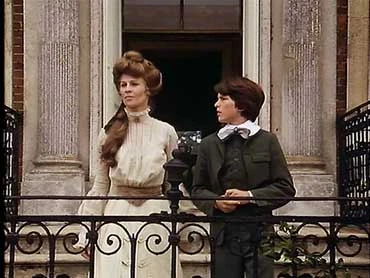
Who Shouldn’t Watch It
“Messenger of Love” might not suit all tastes or preferences. Here are some viewer categories that might not appreciate it:
- Action Seekers: The film is a slow, reflective drama with very few action scenes or high physical tension.
- Commercial Cinema Lovers: Those who prefer simple, straightforward plots with happy endings or clear resolutions might find this film frustrating or unsatisfying.
- Impatient Viewers: The deliberate pace and complex narrative structure might not appeal to those who prefer faster or more linear stories.
- Those Who Avoid Class and Social Conflict Themes: The film addresses issues such as social class and discrimination, which could be uncomfortable for some.
- Children or Teenagers: Due to its mature themes and complexity, the film might not be suitable or interesting for a younger audience.
- Viewers Seeking Lightness: If you’re looking for a film to unwind or relax, the emotional density and serious themes of “Messenger of Love” might not be what you’re looking for.
- Those Who Prefer Explicit to Implicit: The film addresses sensuality and emotional tension in a very subtle way, which might not satisfy those who prefer more direct or explicit representations of such themes.
Overall, if your film preferences lean towards fast entertainment, simple stories, or genres like action, comedy, and fantasy, “Messenger of Love” might not be the best film for you.
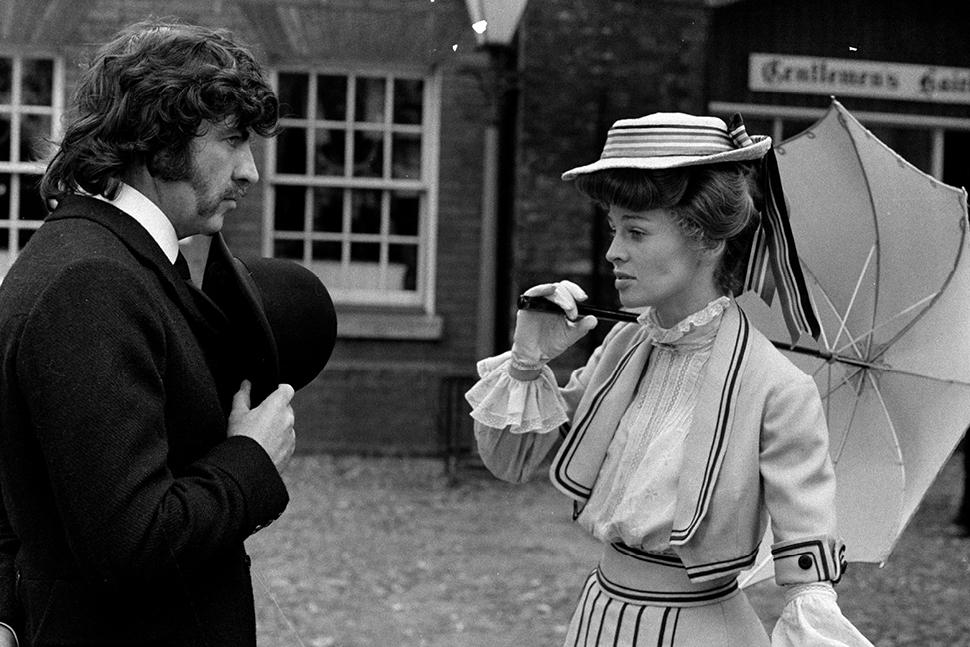
Controversial Points
The film “Messenger of Love” has several elements that could be considered controversial or that might provoke discussion:
- Treatment of Social Classes: While the film explores class divisions, some might criticize how it portrays the power dynamics and gender roles of the era without openly challenging them.
- Moral Ambiguity: The film does not provide clear judgments or resolutions on the characters’ behaviors, leaving it up to the viewer to interpret the morality of their actions. This might be frustrating or disconcerting for some.
- Slow Pace: The film’s reflective and measured approach might be seen as boring or prolix by those accustomed to a faster pace.
- Open Ending: The film’s conclusion is open to interpretations and does not offer a neat or satisfying resolution for all characters, which might not appeal to those seeking a clear and definitive ending.
- Dangerous Nostalgia: While the film is set in a past era and the cinematography makes everything very picturesque, there is a risk that the viewer may romanticize a historical period that also had many negative aspects, such as class oppression and gender restrictions.
- Accessibility: The subtle language and unexpressed implications can make the film inaccessible or difficult to follow for those not used to complex or ambiguous stories.
These points are not necessarily flaws in the film but are aspects that might generate discussion or diverge opinions among viewers.
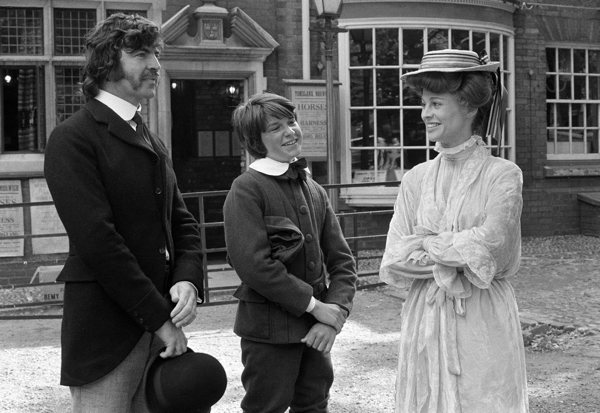
Conclusion
In the cinematic tapestry, “Messenger of Love” emerges as a rare and precious gem, a film that interrogates the viewer as much as it entertains. From Joseph Losey’s careful and sensitive direction to Harold Pinter’s profound screenplay, to Dominic Guard’s memorable performance, each element collaborates in a symphonic balance of talent and intention. This film is not just a love story or a class portrait; it’s an inquiry into the deep and sometimes painful truths of the human condition. It’s a journey into the soul of innocence and a return home that none of us can afford to ignore.
A film that, through its brilliant execution and thematic depth, deserves to be revisited and discussed for generations to come.

